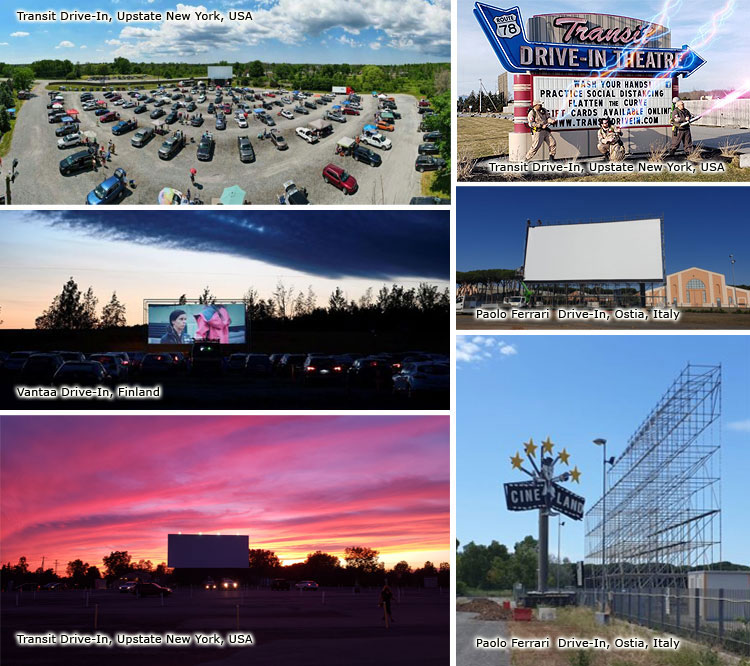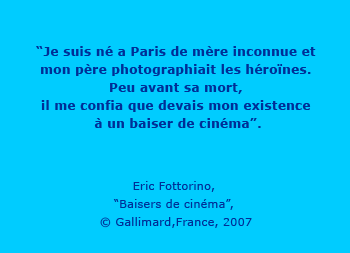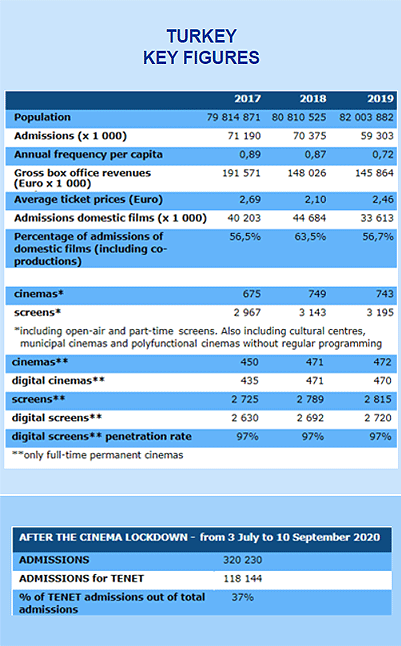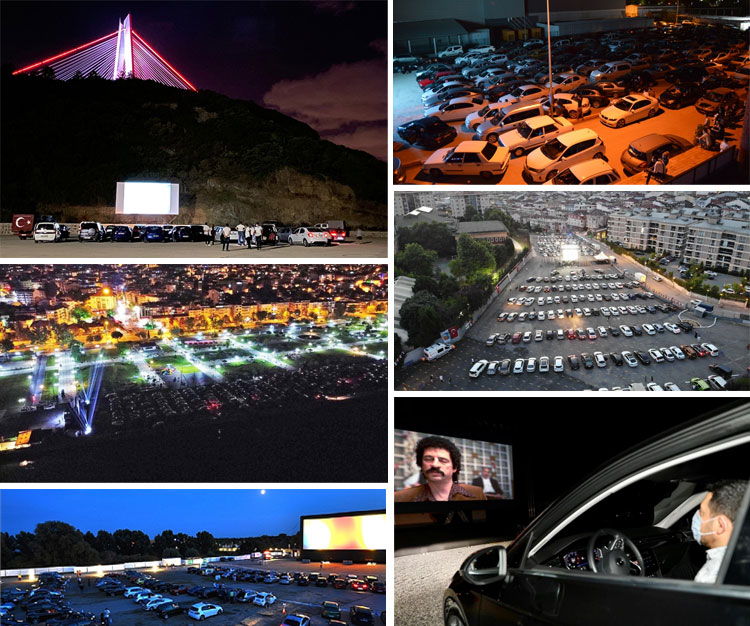SOMETHING NEW: OLD DRIVE IN
by Elisabetta Brunella

Something old. Beginning in the 'Thirties in the USA, the golden age of drive ins came in the post-war period, when they even succeeded in earning more box office than traditional cinemas. Then living and consumer patterns changed and the sun set over the drive in, one of the symbols of the American dream, like Coca Cola or what were known as "built-in kitchens". The spectators - having become consumers - started to prefer the comfort of theatres offering the best quality audio and visual experience, situated in the new, favourite venues of social life: the shopping malls, which enabled the "shop, eat, have fun at the movies" experience all in the same place. And the owners of the vast suburban areas home to the drive ins sold the land to the developers of shopping centres. This is how the over 4000 American drive ins declined in number to 300, with just under 600 screens.
Something new, indeed, very new. With the pandemic, the increased desire to watch a film - widely confirmed by the giddy increase in VoD, amongst other things - combined with the pleasure of going out in safe circumstances, has brought the drive in back into fashion, first and foremost on its native territory and thereafter at all other latitudes. This was clearly stated in the webinar organized by ICTA, the association of technical enterprises in the cinema sector. Amongst those who have never stopped believing in the potential of cinema seen from your own car, someone who places his bets on the technological evolution of projection, is Rick Cohen of Transit Drive-In, a family firm that has been operating for three generations in Upstate New York, only a stone's throw from Niagara Falls.
During these months of Covid a strategy aiming to reassure the public about hygiene and safety, with clear, straightforward messages, combined with an offer of entertainment for the whole family and for teenagers consisting of comedy and evergreens such as Grease or the Harry Potter series, but also alternative content like concerts by the Buffalo Philharmonic, has succeeded in attracting audiences. To the extent that Transit Drive-In, which converted to digital in 2012, has set itself the objective of installing laser projectors, "to obtain," as Rick explains, "truly amazing contrast and luminosity." But many managers of "traditional" cinemas have now changed to the "cinema in the car" formula, too, inventing "parking lot cinemas": the customers stay in their cars on sites that until a month or two previously would simply have been parking lots and watch the film on a screen set up along the outside wall of the cinema. "Bricolage"? Certainly not. Rolando Rodriguez, Vice President of Nato, the powerful U.S. exhibitors' association, stresses that this solution went hand in hand with the adoption of innovative, online-only ways of reserving and buying tickets and concessions, and experiments with safety, disinfection and social distancing procedures, delivery of food and drinks and procedures for accessing buildings, which will also serve for a safe return to cinema inside movie theatres. The objective is to reassure spectators: they can confidently return inside cinemas. Another advantage of "parking lot cinema" is that it keeps audiences linked to the locations they are used to. And informs them, in areas where lockdown has been eased, that "their" cinema has opened its doors again.
In Europe the revival has affected both big countries and small ones. For the first time this summer the Finns enjoyed films from their cars in Vantaa, just a few kilometres from the capital, thanks to an initiative decided by the local authorities. Central Europe saw the launch or re-launch of several drive ins: one, the first in its history, in Serbia, one in Montenegro, 3 in the Slovak Republic, 4 in Bulgaria and Slovenia, 5 in Latvia, Croatia and Hungary. Turkey experienced an authentic blossoming of drive ins, whose numbers rose to 46.
In Russia there are around thirty drive ins with one of the leading chains - Karo - planning another 5, whilst in Spain their numbers have risen from 6 to 10.
It will come as no surprise to learn that the Old Continent, too - in its customer communications - is placing more emphasis on the respect of hygiene measures than on the content of programming, which is generally based on films from the recent past that have come to be part of cinema history (it would have been hard to bet on novelties, since the release of titles expected on the international market for mid-2020 has been postponed to the more or less distant future). In the English capital, the London Drive In displays the trademark "We're good to go" granted by the Tourist Board of the UK and Northern Ireland to tourist and entertainment structures that follow particularly demanding protocols guaranteeing the safety of their visitors.
To promote its activities "out of season", too, this month a ticket with a 50% discount is being offered: from £35 down to £17.50 per car. As to programming, added content is also being experimented, with the offer of live West-End musicals every Saturday in October at the premium price of £65. The gastronomy is becoming more sophisticated, too, and includes a vegan menu. And for those without a car who nevertheless wish to try out the "contact free way to experience film", the exhibitor has come to an agreement with a hire company. Regarding the technology, the search for "contact-free" formulas implying the need for large, outdoor screens, has boosted the adoption of LED screens.
The largest giant screen has been installed in Brussels by Movie Drive, an initiative stemming from the local tourist board and two well-established events organizers: 336 square metres, i.e. around three times bigger than the average surface area of a drive in screen, projecting films for 200 spectators in deckchairs and 200 vehicles, with prices ranging from 10 to 37.50 euros. The Belgian giant Kinepolis has also adopted the formula "films from your car" at home and in the Netherlands, though in an itinerant version. In July and August the Kinepolis on Tour project enabled the inhabitants of large and small towns and their suburbs - from Brussels to Bruges, from Liège to Breda in Holland - to enjoy the drive in experience. On the world's biggest mobile screen (16x9 metres), using LED technology, "cult" movies were screened, from Jumanji to The Lion King - at a price of 25 euros per car. The spectators could order three types of menus, based on popcorn, French fries and fizzy drinks, obviously purchased at a distance together with the ticket. The LED screen was thus the great novelty of the summer but it isn't hard to imagine that it will increasingly become an option for indoor theatres, too.
Italy, instead, holds the record for Europe's biggest traditional screen: 230 square metres at the Paolo Ferrari drive in in Ostia.
Something blue. Last of all, drive ins are not expensive: at Ostia the ticket for one car costs 10 euros. And the sky, red at sunset, then blue and starry, is free of charge - adds Rick Cohen, Head of Transit.
This text is based on an article published in issue no. 179/2020 of Cinema & Video Int'l, the MEDIA Salles media partner.

|






 In addition, in 2019 the Turkish market had already begun to suffer a decline compared to previous years and the number of tickets sold hardly made 60 million, decidedly fewer than the over 70 million sold in 2018 and 2017. Obviously the hopes of those working in the sector, whose objective was recovery in 2020, were dashed by the pandemic that has affected the whole world. The crisis also affected national production, which in Turkey traditionally accounts for an important percentage of box office.
In addition, in 2019 the Turkish market had already begun to suffer a decline compared to previous years and the number of tickets sold hardly made 60 million, decidedly fewer than the over 70 million sold in 2018 and 2017. Obviously the hopes of those working in the sector, whose objective was recovery in 2020, were dashed by the pandemic that has affected the whole world. The crisis also affected national production, which in Turkey traditionally accounts for an important percentage of box office. 

 For the last 20 years, as event organizer, I have been presenting the "Best of the Best" from the arts world in Greece and Cyprus, with live performances spanning from New York Acrobats to the Flamenco Ballet of Andalusia. At the same time, both as filmmaker and film lover, I have been striving to create opportunities for meetings between audiences and directors, for example at the Cyprus Int'l Film Festival and the Bridges Film Festivals in Corinth and Nafplio. COVID 19 has unexpectedly changed our lives and the impossibility of being physically present at performances has made it all the more evident how essential culture, the arts, entertainment and the cinema are, for all of our lives.
For the last 20 years, as event organizer, I have been presenting the "Best of the Best" from the arts world in Greece and Cyprus, with live performances spanning from New York Acrobats to the Flamenco Ballet of Andalusia. At the same time, both as filmmaker and film lover, I have been striving to create opportunities for meetings between audiences and directors, for example at the Cyprus Int'l Film Festival and the Bridges Film Festivals in Corinth and Nafplio. COVID 19 has unexpectedly changed our lives and the impossibility of being physically present at performances has made it all the more evident how essential culture, the arts, entertainment and the cinema are, for all of our lives. This is therefore proving to be the right time for the launch of the
This is therefore proving to be the right time for the launch of the 